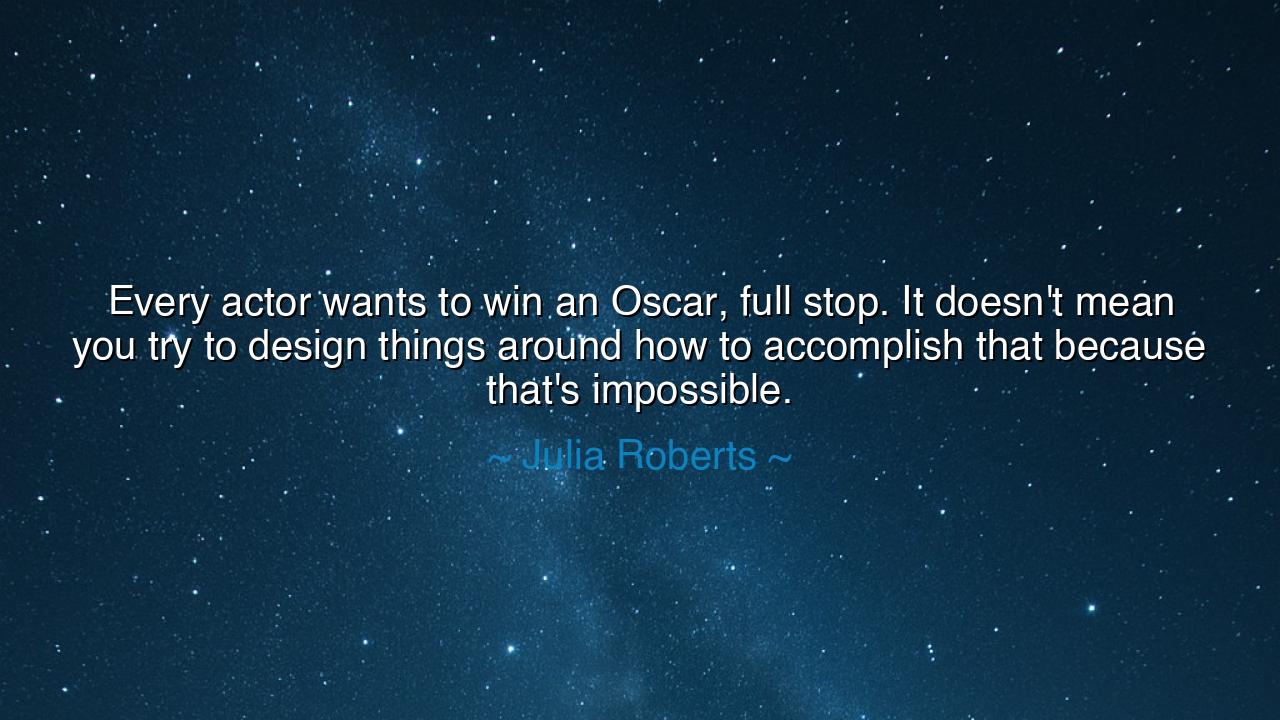
Every actor wants to win an Oscar, full stop. It doesn't mean you
Every actor wants to win an Oscar, full stop. It doesn't mean you try to design things around how to accomplish that because that's impossible.






"Every actor wants to win an Oscar, full stop. It doesn't mean you try to design things around how to accomplish that because that's impossible." – Julia Roberts
In these candid words, Julia Roberts, one of the most luminous stars of modern cinema, offers a profound lesson on the nature of ambition and authenticity. She acknowledges the universal desire among actors — the longing for the Oscar, the pinnacle of recognition — yet she warns against shaping one’s craft solely to achieve it. True mastery, she implies, cannot be reduced to strategy or manipulation; it is born from dedication, passion, and fidelity to the work itself. Roberts’ insight resonates far beyond acting, speaking to all who aspire to excellence in life: the highest achievements emerge not from calculation, but from authentic engagement with one’s purpose.
The origin of this quote comes from Roberts’ long and storied career in Hollywood. Having won an Academy Award herself, she speaks with the authority of experience: the recognition she received was not the product of scheming, but of immersion in her roles and commitment to the art of storytelling. By emphasizing the impossibility of designing a path to accolades, she underscores a timeless truth: artistic success is not guaranteed by formula, but earned through genuine endeavor. Attempting to manipulate outcomes undermines both the integrity of the craft and the joy of creation itself.
This principle echoes the teachings of the ancients, who valued virtue and excellence over external reward. Aristotle, in his Nicomachean Ethics, asserted that the purpose of human endeavor is not honor itself, but the cultivation of excellence and character. One pursues a craft not to win praise, but to fulfill one’s potential. Roberts’ words mirror this ancient philosophy: the pursuit of recognition is natural, yet it must never dictate the heart’s engagement with the work. True achievement arises when skill and authenticity converge.
Consider the story of Ingrid Bergman, the legendary actress of the Golden Age of Hollywood. Though she won multiple Oscars, her greatest triumphs came not from strategic positioning, but from the depth, honesty, and fearlessness she brought to her roles. Her legacy endures because she immersed herself fully in the art of acting, not in schemes to claim awards. Like Roberts, Bergman teaches us that external accolades are transient, but the impact of genuine dedication resonates across time.
Roberts’ words also illuminate the tension between desire and obsession. Every artist may yearn for recognition, but when the desire for reward eclipses the love of the craft, creativity becomes constrained. By cautioning against designing one’s work around an award, she advocates for a focus on process over outcome, on the integrity of the performance rather than the anticipation of accolades. In this, she echoes the wisdom of Confucius, who taught that true excellence emerges when one devotes oneself fully to the present duty, without attachment to reward.
Furthermore, this insight reminds us of the unpredictability of life. Even the most brilliant work may not be recognized in the ways we expect. By centering ambition on authentic effort rather than calculated achievement, we maintain resilience and equanimity in the face of uncertainty. Roberts’ reflection is thus both a lesson in humility and in pragmatic wisdom: while goals inspire, they must not distort the essence of the work or the joy of creation.
Lesson: My children, pursue your calling with full devotion, not with the sole intent of reward. Let your efforts be guided by passion, integrity, and skill, and not by the anticipation of recognition. Excellence, like the finest art, is its own reward, and true acclaim will follow naturally when the work itself is worthy. Julia Roberts teaches us that ambition is honorable, but obsession with outcomes can blind the heart to the beauty of the journey itself.
In the end, Roberts’ wisdom calls us to center ourselves on authentic action. To achieve greatness, one must engage fully, trust the process, and let the fruits of effort reveal themselves in time. Recognition may come, as it did to Roberts and countless others, but it is the devotion to craft, not the calculated pursuit of acclaim, that ensures enduring impact. In this, we find the eternal truth: to labor with love and purpose is the surest path to lasting honor.






AAdministratorAdministrator
Welcome, honored guests. Please leave a comment, we will respond soon